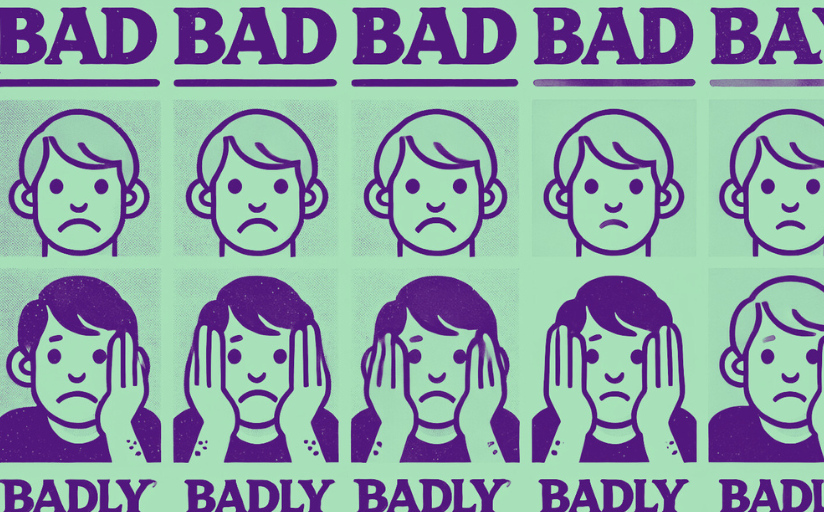If I said that I feel badly, would you tell me to eat a cup of chicken noodle soup and rest, or would you wonder why my sense of touch is messed up? The bad vs. badly misunderstanding is persistent, so let’s make sense of these commonly confused words.
Bad vs. Badly at a Glance
The main difference between the words bad and badly comes in their meanings. See below:
* Bad means “unwell.” It is also used to describe the opposite of good.
* Badly describes how something is done, or it is used as an intensifier.

When To Use Bad
The adjective bad often comes after linking verbs (appear, be, feel, smell) to describe a subject’s state of being or condition. Bad generally means “not good,” “unwell,” or “inadequate,” and it also modifies a noun.
Examples of Using Bad:
– Jane felt bad when her dog ran away. (Jane was sad when her dog ran away.)
– Jane had a bad dog. (The dog was disobedient.)
When To Use Badly
Badly is an adverb that modifies action verbs.
Examples of using Badly:
– Tim played the piano badly. (Tim is not skilled at playing the piano.)
– I slipped on the badly cleaned floor. (Someone didn’t do a good job of cleaning the floor, so I slipped.)
Badly also acts as an intensifier, which enhances the emotional influence of an expression.
– Jack’s arm was badly broken. (Jack’s arm is severely broken.)
– I badly want the job. (I want the job so much.)
Still Confused on Whether To Use Bad or Badly?
One reason bad and badly are confused so often is that many linking verbs can be used as action verbs. For example, you can use “feel” to describe your state of being and the act of touching something.
If you’re a little shaky on whether a word is being used as a linking verb or an action verb, try substituting the word you want to use (bad/badly) with a similar word and see if it makes sense.
– The hotel guest felt miserably.
– The hotel guest felt miserable.

Which bad vs. badly example sounds more natural to you? Number two, right? Right! So in this case, bad is correct, unless you want to portray that the hotel guest was in a competition for touching and did a terrible job.
– The hotel guest felt bad.
Bad vs. Badly: Don’t Be Bad at Grammar
Viktor E. Frankl once said, “When we are no longer able to change a situation … we are challenged to change ourselves.” A lot of people are going to use bad and badly incorrectly, but you don’t have to be one of them.
Memorize these grammar rules and kick the bad vs. badly confusion to the curb. If you use a trick to tell these two words apart, please share below!


Leave a Reply